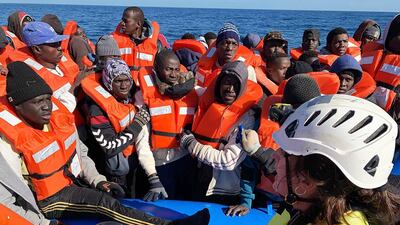European Union member states could be guilty of crimes against humanity for consciously cooperating with Libyan authorities to intercept migrants leaving by sea and taking them back to the war-torn country, according to a damning report released by Human Rights Watch on Monday.
“Migrants and asylum seekers detained in Libya, including children, are trapped in a nightmare, and what EU governments are doing perpetuates detention instead of getting people out of these abusive conditions,” said Judith Sunderland, associate Europe director at Human Rights Watch.
The report also quotes Nils Melzer, UN special rapporteur on torture, saying that “if European countries are paying Libya to deliberately prevent migrants from reaching the safety of European jurisdiction, we’re talking about complicity in crimes against humanity because these people are knowingly being sent back to camps governed by rape, torture and murder”.
The report found that by pouring millions into the coffers of the Tripoli-based Government of National Accord – the UN-backed interim government of Libya – the EU is effectively exposing asylum seekers to the risk of torture, sexual abuse and forced labour in contravention with international law and the principle of non-refoulement.
Officials in the EU and the current governments of France, Germany, the United Kingdom – as well as Italy’s previous government – have all admitted they are aware of abuses against migrants and asylum seekers in Libyan detention centres.
_______________________
Read more:
Pope Francis leads prayers for 170 migrants missing in Mediterranean shipwrecks
UN Assembly head talks migration and battling prejudice on eve of Pakistan tour
Stranded migrants disembark in Malta after EU deal reached
_______________________
Nonetheless, they continue to work with Libyan authorities to ensure that migrants are kept within its borders.
Elijah, 26, from Sierra Leone, was being detained in Misrata when HRW interviewed him on July 10, 2018. He described the place he found himself in as “hell”. “They pretend to be nice people but then they flog [shock] you with electricity,” he said.
Out of four detention centres visited by HRW in early July 2018, the organization found evidence of low quantity and poor-quality food and water in all of them. No detention centre was equipped with healthcare professionals on staff and in Misrata, Tajoura, and Zuwara, HRW heard disturbing accounts from both adults and children of violence by guards, including beatings, whippings and use of electric shocks. Detainees in all centres said that guards treated them roughly and insulted them.
By providing substantial funding to intercept migrants seeking to leave the Libya by sea, the EU and some of its member states – above all Italy – are facilitating the forced return of migrants to a country that grants no protection.
Italy defended its support of the Libyan coast guard by saying it saves lives at sea by making it more difficult for boats to attempt the journey. While the number of arrivals on European shores have decreased, the rate of death per attempted crossing significantly increased as a consequence of Italy’s crackdown on rescue missions. UNHCR estimated that one in 18 people died or went missing in the period January-July 2018 compared to one in every 42 people in the same period in 2017.
In a case that could set a precedent, Italy now stands accused by seventeen Nigerian survivors of a 2017 migrant boat shipwreck of exercised effective control over the Libyan Coast Guard and bearing therefore responsibility for the tragedy.
The EU has allocated €266 million from the EU Emergency Trust Fund for Africa for migration-related programs in Libya, and an additional €20 million through bilateral assistance. Financial aid is designed both to increase the capacity of Libya’s border control and to address chronic and systemic problems in Libya’s detention regime for migrants.
However, HRW found the situation in Libya to undermine the voluntary nature of the program.
Isaac, a 21-year-old from Nigeria detained in the Zuwara DCIM centre, was quoted by HRW in an interview as saying: “Here, the guards told me I can’t get out unless I agree to go home. So, I’m left with no option.”
HRW argued in the report that asylum seekers may be forced to return to their countries of origins, where they may be at risk of persecution. A humanitarian worker in Libya who wished to remain anonymous told HRW that IOM is essentially deporting people on behalf of the Libyan authorities free of charge.
EU institutions do not directly fund Libya’s Directorate for Illegal Migration (DCIM), but channel all funding to UN agencies and nongovernmental organizations that work to improve conditions in the centres where the detainees are being held.
This often results in poor coordination and even disputes among humanitarian actors, including UN agencies, and the lack of a framework that regulates the interaction between humanitarian assistance in the context of the Libyan conflict.

